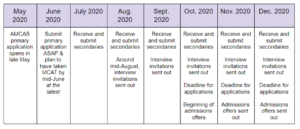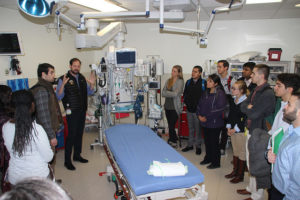By: Alessandra Santiago
For those pre-meds who receive an interview invitation to a medical school, good news! That means you are academically qualified for admission. However, the final decision about whether or not you are offered a place in the upcoming class is contingent upon how well you conduct yourself during the interview. Let’s dive in and see how to nail your interviews.


First, let’s review the typical candidate selection process before an acceptance is sent out. After you have submitted your Primary and Secondary applications, your file is reviewed by the academic board and admissions officers of the school. This typically happens between June/July – February. During this time, some schools may request that you take a situational judgment test called Computer-based Assessment for Sampling Personality characteristics test (CASPer) before they send out interview invitations in order to assess your on-the-spot response to ethical dilemmas. Then, the interview invitations get sent out between August – March. After you complete the interview, the admissions committees will make their decisions between October – April/May at the latest.
Knowing the timeline for this process is important. You can when to expect interview invitations to come in and when to make decisions about re-applying in a subsequent cycle. When you receive an invitation, respond quickly and politely. If your medical schools are holding on-campus interviews, you can start making travel plans to the school, and you should try to arrive a day before your interview to settle in and familiarize yourself with the environment. Avoid taking red eye flights the night before your interview.
Once you have arrived for your interview, the school may have you embark on a walking tour of campus, so be sure to dress for the activities in which you will participate. That means wearing comfortable shoes, an appropriate suit for going on a job interview, minimal accessories, and light (preferably non-existent) scents. Pack appropriately before you arrive on campus, and on the day of your interview, turn off your phone to avoid unnecessary distractions.

What type of interview might you expect? Typically, there are two ‘umbrella’ types of interviews that medical schools conduct: traditional/unstructured interviews and Multiple Mini Interviews (MMI). A traditional interview lasts between 30-60 minutes, takes place in one room or online, and is most similar to a job interview in its Q&A format. A traditional interview can be of several types:
- One-on-one conversations between prospective student and interviewer, who is either a faculty member, current student, alumni, or admissions committee member
- Group interviews wherein several pre-meds are present in the same room at the same time with a shared interviewer
- Panel interview with multiple members of the school interviewing a single candidate
In an MMI, applicants are placed into groups and cycle through different rooms with 8-10 stations consisting of ethical dilemmas, team problem-solving tasks, or more traditional group interviews with different ‘raters’ in each room who will score each applicant individually. This is a team-based exercise that highlights your collaborative and problem-solving skills. How well can you identify the stakeholders of an ethical dilemma? What are the complications of a tentative course of action? How well are you able to collaborate with your teammates and provide feedback? In an MMI, it is important to be able to evaluate all possible sides of an issue, take a position based on your deliberation about the most ethical path forward, and practice clear communication with your teammates.
Outside of the scenarios-based interviewing in the MMI, interview questions test your ability to respond under pressure or try to better understand your desires to pursue medicine beyond what you have written in your application. Such questions can be similar to the secondary essay prompts, so expand beyond what you have already written. Consider the following questions:
- Why do you want to pursue medicine?
- Who has influenced you the most in selecting medicine as your career path? In what ways did they influence you?
- What has been your greatest challenge, and how did you overcome it?
- How did you decide you wanted to become a physician?

Whether the medical school conducts a traditional interview or an MMI, applicants should review their application materials before their interview in order to best answer these questions. Interviews may not be the time to elaborate further about your background; rather, a solid interview will confirm and elaborate upon the person you have presented in your application. Medical schools want to be sure that an applicant will fit with their mission, philosophy, cohort, and curriculum, and it is important for students to leave the interviewer with a clear portrait of your ‘softer’ character traits that make you a good fit for their school. Be sure to do several mock interviews before your interview date to get feedback about your interviewing style.
At the end of the interview or during your school tour, you will have the opportunity to ask questions. Try to ask your interviewer questions that have not already been covered on the tour and are not easily found by a quick web search of their school’s programs. It can be a good idea to ask about the specialty programs or opportunities at that school; if there is career or financial counseling at the school; what types of mentorship and networking opportunities are available; and how interpersonal conflict is handled at that school, to name a few questions. For more ideas, check out Student Doctor Network for insightful questions to ask.
Finally, quickly follow up your interview with a written thank-you note to your interviewer. An email will suffice, though a hand-written note is always greatly appreciated. Your admission status decision will be delivered by phone, email, or letter within 2-6 weeks of your interview.
| Assignment #19: Look into possible interview questions and begin to formulate your responses. Find a mock-interviewer who will conduct a practice interview and provide feedback to your answering skills. Familiarize yourself with CASPer and the MMI format. |
If you want to learn more about navigating the Pre-Med journey, check out our Getting Into Med School: Tips and Tricks Blog.
